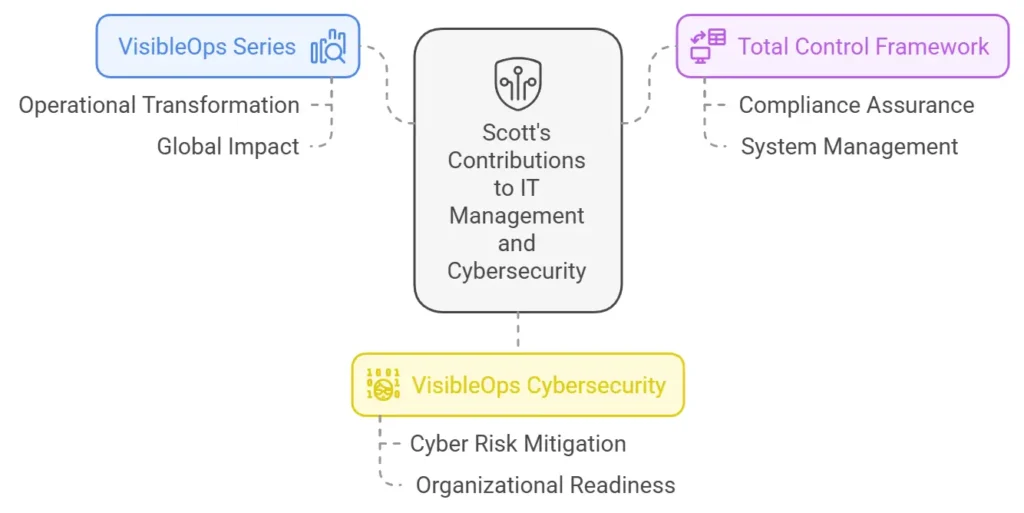
Pioneering the Digital Age with IT Management and Cybersecurity with Scott Alldridge
Statista’s Market Insights projects the global cost of cybercrime to increase from $9.22 trillion in 2024 to $13.82 trillion by 2028. Businesses are struggling to balance IT efficiency with robust security. As threats grow, solutions must evolve.
Scott Alldridge, CEO of IP Services notes that “The key to surviving today’s digital challenges is integrating proactive IT management with resilient cybersecurity measures.”
The pressure to keep systems secure while scaling operations is enormous. Scott Alldridge’s innovative frameworks, like VisibleOps and the Total Control Framework, are bridging the gap between IT management and advanced cybersecurity. This blog explores his contributions, actionable insights, and the steps businesses can take to strengthen their systems.
The Growing Need for IT Leadership in a Complex Cyber Landscape
IT systems are now the backbone of almost every business process. Yet, this dependence creates vulnerabilities. Businesses face increasingly sophisticated attacks, targeting sensitive data and essential operations.
According to a 2024 report by IBM, the average cost of a data compromise has risen to $4.88 million globally. These escalating costs threaten business continuity and competitiveness.
The challenge lies in managing the complexity of modern IT environments. Hybrid systems, remote work, and constant digital transformation demand innovative leadership. Leaders like Scott Alldridge are demonstrating how strategic IT management can counteract these vulnerabilities and empower businesses to thrive.
This balance between security and operational excellence is essential for any organization that prioritizes resilience and growth.
Scott Alldridge’s Vision for Transformative IT Solutions
Scott Alldridge has over 30 years of experience in IT management and cybersecurity. As CEO of IP Services and President of the IT Process Institute (ITPI), he drives innovative solutions that align IT systems with business goals. His expertise extends to developing frameworks that merge stability, compliance, and security.
Through initiatives like the Total Control Framework, Scott delivers measurable value. For instance:
- Improved Compliance: The framework includes SOC 2 and other standards to ensure regulatory alignment.
- Enhanced Efficiency: By streamlining operations, organizations see reduced downtime and fewer disruptions.
- Strategic Guidance: Scott’s methodologies help businesses connect IT systems to long-term objectives.
These solutions emphasize resilience and scalability, which are both essential for organizations navigating today’s IT challenges.
From IT Processes to Total Control Frameworks
Scott’s contributions began with the VisibleOps methodology, a transformative approach to IT management. This methodology focuses on operational excellence by eliminating inefficiencies and aligning processes. VisibleOps gained global recognition, with organizations in various industries adopting its principles.
Building on its success, Scott developed the Total Control Framework to address evolving business needs. This enhanced framework includes tools for real-time monitoring, compliance tracking, and performance optimization.
It provides:
- Proactive Monitoring: Identifying issues before they impact operations.
- Scalable Security: Adapting to business growth without compromising data protection.
- Integrated Compliance: Simplifying adherence to standards like GDPR and HIPAA.
This evolution demonstrates how structured methodologies can drive tangible improvements in IT operations.
Innovations Driving Cybersecurity Leadership at IP Services
Today’s cyber threats demand more than basic defenses. Scott Alldridge’s cybersecurity strategies go beyond traditional measures, focusing on advanced technologies and proactive approaches.
His innovations include:
- Zero Trust Architecture: Ensuring every access request is verified before granting permissions.
- AI-Driven Threat Detection: Leveraging machine learning to identify anomalies and mitigate risks.
- Micro-Segmentation: Dividing networks into isolated segments to limit the impact of breaches.
These measures ensure robust defenses while supporting business agility. For example, implementing Zero Trust frameworks has reduced attack surfaces for many IP Services clients. Scott empowers businesses to stay ahead of cybercriminals by focusing on actionable, forward-thinking strategies.
Milestones That Redefined IT Management and Cybersecurity

Scott’s contributions have shaped the industry in meaningful ways. Some of his notable achievements include:
- VisibleOps Series: A co-authored methodology that transformed IT operations worldwide.
- Total Control Framework: A comprehensive solution for managing IT systems and ensuring compliance.
- VisibleOps Cybersecurity: An upcoming guide that addresses modern cyber risks and organizational readiness.
These frameworks are not just theoretical; they deliver measurable results. Businesses using these tools report:
- Reduced operational costs by 15-20%.
- Faster compliance readiness, cutting audit preparation times by 40%.
- Enhanced uptime, achieving 99.999% availability.
Each milestone underscores Scott’s commitment to creating actionable, impactful solutions.
Building Resilience in Modern Businesses
Resilience is critical in today’s unpredictable environment. IP Services supports businesses by ensuring:
- Continuous Monitoring: Real-time insights into system performance and potential risks.
- Disaster Recovery: Rapid recovery plans to minimize downtime and data loss.
- Custom IT Solutions: Tailored strategies that address specific organizational needs.
These capabilities empower you to focus on growth while maintaining confidence in your systems. With Scott’s leadership, IP Services blends innovation and reliability to help organizations succeed in the digital era.
Key Elements of the Total Control Framework
The Total Control Framework stands out for its comprehensive approach. Below is a breakdown of its core elements and their benefits:
| Element | Description | Key Benefit |
| Proactive Monitoring | Real-time tracking of system performance and vulnerabilities | Prevents issues before they arise |
| Compliance Management | Tools for managing regulatory standards like SOC 2 and GDPR | Simplifies compliance processes |
| Threat Detection and Response | AI-driven tools to identify and respond to risks instantly | Erosion of trust, leading to loss of business. |
| Evolving Compliance Regulations | Meets regulatory standards, avoiding fines and penalties. | Reduces response times significantly |
| Scalability | Framework adapts to growing organizational needs | Supports long-term growth |
Leading IT and Cybersecurity Solutions with IP Services
Scott Alldridge’s impact on IT and cybersecurity is clear. His innovations, from VisibleOps to the Total Control Framework, redefine how businesses approach IT challenges. His leadership at IP Services delivers real results, from 99.999% uptime guarantees to seamless compliance solutions.
IP Services helps organizations optimize IT systems, strengthen security, and align technology with business goals. With a 30-day onboarding time and proactive monitoring services, IP Services ensures dependable and efficient solutions.
Contact IP Services today to schedule a consultation and explore how our expertise can support your growth.


